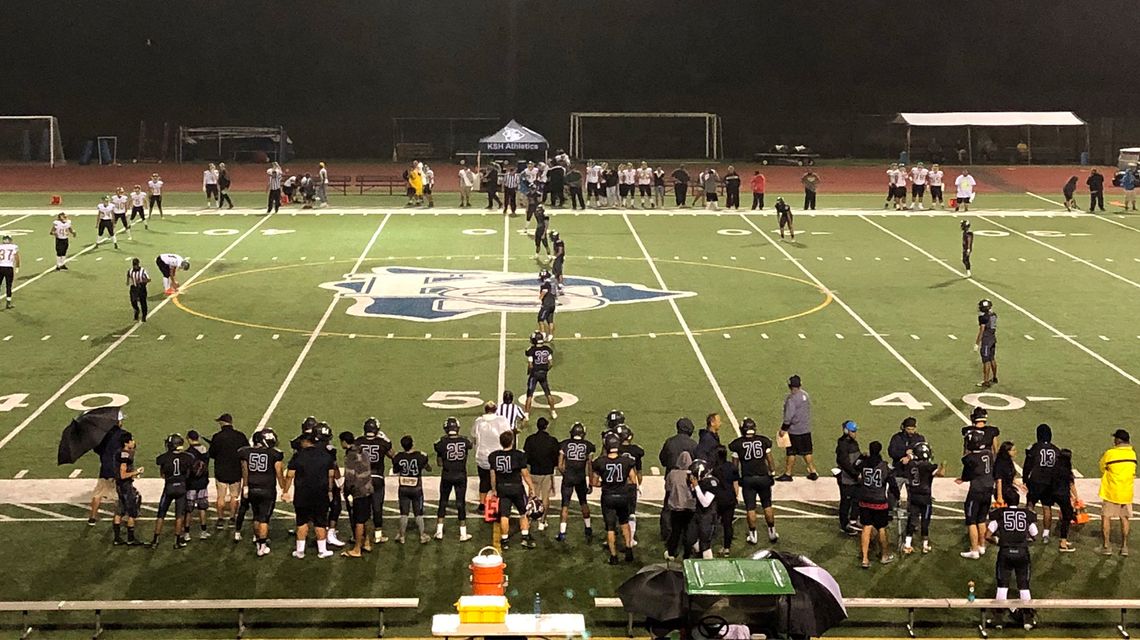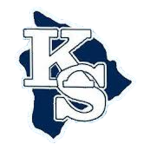
Kamehameha football to communicate in Hawaiian, hopes to instill deeper sense of native pride
KEA’AU, Hawaii (BVM) – Language is a factor of football that is oftentimes overlooked from an outside perspective. In a sport where actions speak exponentially louder than words and one that is typically played in front of raucous crowds, conversation is an afterthought between the whistles.
Coming from a former collegiate quarterback, communication is everything on the field of play. In fact, a lapse in the relay of messages can be the difference between a momentum-shifting play and a negative result, or the difference between the reason a coach keeps his job and the reason he or she is looking for another one at season’s end.
It’s why what first-year Kamehameha-Hawaii head coach Kealoha Wengler plans to do is so captivating.
Wengler has spent the last six years as a school counselor at the elementary level at Kamehameha but aside from that, he’s coached both the junior varsity and varsity football teams at a Hawaiian immersion school on Oahu.
Those teams were described as unique because they used the Hawaiian language to communicate on the field. From play calls to audibles, formations and coverages, everything was voiced in their native vernacular.
It won’t be new to Wengler and the average fan is unlikely to notice the difference from their seat in the stands, but the Warriors will be the only Big Island Interscholastic Federation (BIIF) team to communicate in Hawaiian on the field.
“I hope to accomplish this because all of our athletes are Hawaiian,” Wengler said. “I hope it will instill a deeper sense of pride and identity in who we are as native Hawaiians, and contribute to the revival of our language and heritage. I’m hoping we can measure our success as a team not only by the wins, losses, and points on the scoreboard, but how we contribute to helping our language and culture to emerge to a state of normalcy and commonality.”
During Wengler’s tenure at an immersion school, he said there was no option to coach or teach in English; Hawaiian was the means of communication. As one of just a few native language speaking-coaches, Wengler said he and others were tasked with inspiring high school students — who felt speaking English was more fashionable — to see it differently.
Wengler said this challenge was a success and the result was advantages over other opponents on the gridiron. As an undersized team, Wengler said their communication in Hawaiian benefited as a 12th member on the field to help ensure the right position and alignment.
“If an opponent’s defense was out of position or if we could recognize a mismatch, we could communicate it in Hawaiian and a play could be called to our advantage,” Wengler said. “When we were extremely short on numbers or when we needed to move to a hurry up offense, we utilized our Hawaiian language to our advantage to save that time and energy that it took to huddle and simply call our plays right on the line of scrimmage.”
Similar to the shortage of native language speaking-coaches at Wengler’s previous stops, he said he believes more Hawaii teams don’t implement this because the islands are limited as far as Hawaiian language speakers who are also capable of coaching.
This relatively small group of individuals are extremely busy impacting other areas of need in the community, Wengler said, and asking them to coach might pull them away from much more important work.
“They are oftentimes the ones fighting for all the many things that are constantly being taken away from our native Hawaiian people,” Wengler said. “Recruiting our language speakers from the community often puts our community at risk of losing or dropping something that they were previously involved in to benefit their local sports program.”
Kamehameha is not a Hawaiian immersion school where fluency in Hawaiian is a given so this adjustment won’t be easy. The majority of Kamehameha students are not fluent, Wengler said, but they all have some foundational language knowledge.
While Wengler certainly expects the use of the Hawaiian language to result in on-field benefits, the first-year head coach hopes it’ll also further students’ understanding of their language and culture to share with their current and future families.
The installation of a deeper pride in themselves is Wengler’s ultimate goal.
“Although there are numerous physical advantages of communicating in Hawaiian, the pride of speaking in the language of our ancestors has provided a higher level of motivation to our athletes than we anticipated,” Wengler said. “With more athletes graduating from immersion schools and the booming Hawaiian language programs, it is only time before other Hawaiian teams start doing the same.”





